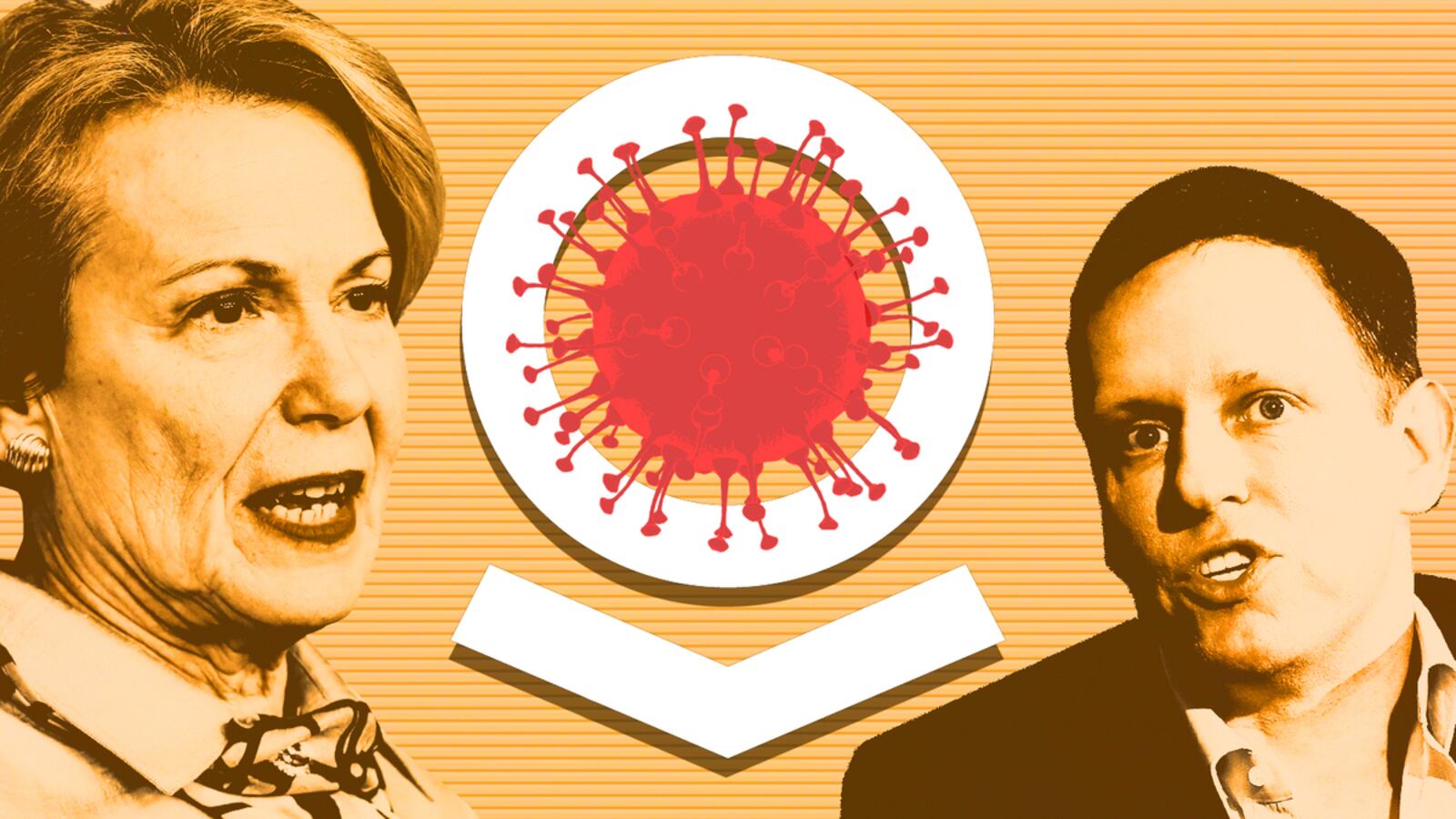A Silicon Valley company co-founded by a close ally of President Donald Trump will play a major new role in helping the government track the spread of the coronavirus, pulling information that is being used by top administration officials, including the president himself.
Palantir, the data-mining firm created by investor Peter Thiel, is best known for its work with global intelligence, military, and law enforcement agencies. Now, the company has a contract with the Department of Health and Human Services to help the federal government create a new data platform called HHS Protect Now.
The Daily Beast has confirmed that Palantir will provide a major aspect of the analytics platform. Sources familiar told The Daily Beast that Palantir’s data suites will be a primary contributor to HHS Protect Now, if not the core element of the tool.
Palantir’s involvement in the creation of a new government coronavirus data platform system underscores the Trump administration’s reliance on close political allies of the president to respond to the global pandemic. Thiel was Trump’s earliest and highest-profile backer in Silicon Valley, and delivered a prime-time speech at the 2016 Republican National Convention. A top donor to conservative causes and the first outside investor in Facebook, Thiel was, according to The Wall Street Journal, instrumental in pushing the social networking giant to allow politicians to lie in advertisements on the platform. It’s a policy that many outside observers believe will help the Trump campaign—which Thiel has again pledged to support.
Palantir, which Thiel helped found—and still retains a sizeable stake in —has watched its already-lucrative government business skyrocket in the Trump era. Palantir “provided digital profiling tools” to Immigration and Customs Enforcement “as it carried out President Trump’s increasingly controversial policies for apprehending and deporting undocumented immigrants,” according to The Washington Post. The firm had anticipated going public, although the coronavirus may have delayed plans for an IPO.
The HHS Protect Now platform, which is set to be unveiled later this week, pulls data from across the federal government, state and local governments, healthcare facilities, and colleges, to help administration officials determine how to “mitigate and prevent spread” of the coronavirus, according to a spokesperson for the department.
Dr. Deborah Birx, the coordinator of the White House’s coronavirus response, receives nightly briefings based off data compiled and analyzed on the platform, the spokesperson said. Birx has, over the past several weeks, often appeared at daily press briefings to speak about her analysis of coronavirus data-related testing, hospitalizations and community spread.
Two officials working with the administration’s coronavirus task force said the president is himself relying on Birx’s presentations in determining where and when to reopen parts of the U.S. economy. That positions HHS Protect Now as one of the most important data tools the federal government possesses.
Palantir declined to comment for this story. The White House did not return a request for comment. HHS told The Daily Beast that the department was working with the Centers for Disease Control and Prevention (CDC) and the Federal Emergency Management System (FEMA) on scaling the HHS Protect Now project, which became operational on April 10.
“We are using the data aggregated... to paint a picture for the Task Force, and state and local leaders to show the impact of their strategic decisions,” the spokesperson said. “For instance, if there are a number of cases concentrated at a hospital next to an airport and a mass transit stop, we can build a predictive model using a transmission chain to predict how quickly the disease will spread taking into account these factors.”
HHS said it has 187 data sets integrated into the platform, with inputs that include hospital capacity and inventories, supply chain data from the government and industry, diagnostic and geographic testing data, demographic statistics, state policy actions, and coronavirus and flu-like emergency department data. The spokesperson also said HHS was relying on “private sector partner contributions of data.”
An internal Trump administration document obtained by The Daily Beast said HHS Protect Now would be “the single source for testing data by April 20.”
One of Palantir’s data platforms, known as Foundry, is expected to play a key role, according to sources familiar with the arrangement. Forbes reported in March that the CDC was using Foundry to keep track of hospitals’ ability to cope with the surge in coronavirus patients.
According to a former Palantir official, Foundry aggregates and visualizes a vast array of data and is particularly helpful for identifying when data is missing–like, for instance, if states, counties or hospitals submitting information on available hospital beds leave out a cell on a digital spreadsheet.
“It’s a data integration and management platform that allows you to bring together many types of data sets, combine them, and do analysis against them,” the ex-Palantir official explained. “They’re really good at working the infrastructure around data and how to make it useful for end users.”
On April 10, Palantir received a $17.3 million contract with HHS for a different and older data integration tool called Gotham. It’s unclear if Gotham, which started out as a tool for intelligence and law enforcement to track targets, will be separate from HHS Protect or will aid in performing contact tracing. That HHS contract is nowhere near Palantir’s most lucrative. In February, the firm scored half of a Pentagon data-management contract worth over $800 million.








